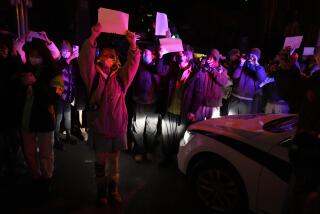In Tunisia, social media are main source of news about protests
- Share via
In Tunisia’s state of unrest, protesters are using blogs, Facebook, Twitter, WikiLeaks documents, YouTube and other methods to mobilize and report on what is going on.
The weeks of demonstrations, including the deaths of at least three and as many as 20 people, have been largely ignored by the majority of media outlets until recent days.
The Internet has been the largest source of news about the protests, and much of it has been provided by the demonstrators themselves, despite Tunisia’s strict censorship of the Web.
Given the nature of the Internet, information about the protests ranges from propaganda to documenting the reality on the streets.
More than 3,000 videos on YouTube have been tagged with the words, “Sidi Bouzid,” the city where many of the protests have taken place and where Mohamed Bouazizi, 26, engulfed himself in flames last month after police seized his unlicensed produce stand and left him out of work and unable to find a job.
Thousands of tweets have been sent about the protests, so many that “Tunisia” was a trending topic in San Francisco early Friday.
“We might be able to provide thoughtful analysis after all the events of Tunisia unfold,” said Carolyn Penner, a Twitter spokeswoman.
“But, right now, along with the rest of the world, we sit back and watch in awe at how people are using Twitter and other platforms to provide on-the-ground perspective during this highly developing and potentially historical moment,” she said.
Despite rigid censorship, the protesters have been aided by such external online activists as the collective known as Anonymous, according to the blog NDItech DemocracyWorks.
“Allies of the regime have reportedly engaged equally enthusiastically, utilizing phishing, censoring and hacking against activists,” said the nonprofit group, which advocates for democracy worldwide.
Social media in particular have been a major battleground between the government and those demonstrating against it.
The “hacktivist” group Anonymous has sided with protesters in Tunisia and posted multiple videos on YouTube about the situation, including graphic images of violence.
Some warn against giving the Web and blog groups too much credit, especially for prompting President Zine el Abidine ben Ali to flee. He had been in power for more than two decades and was a major focus of about four weeks of massive demonstrations against widespread unemployment and corruption in the African country.
Laila Lalami, a Moroccan writer based in Los Angeles, wrote on Twitter, “Please stop trying to give credit to WikiLeaks, or Twitter, or YouTube for the toppling of Ben Ali. The Tunisian people did it.”
Later, she tweeted, “The Internet facilitates communication, but it alone doesn’t keep people in the streets for four weeks.”
nathan.olivarezgiles@latimes.com
More to Read
Sign up for Essential California
The most important California stories and recommendations in your inbox every morning.
You may occasionally receive promotional content from the Los Angeles Times.










